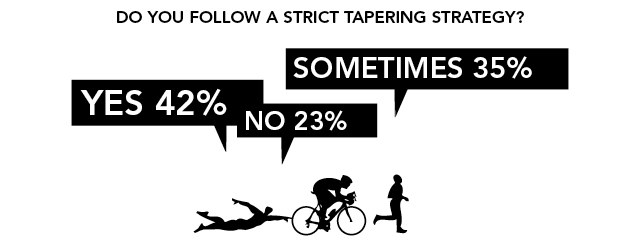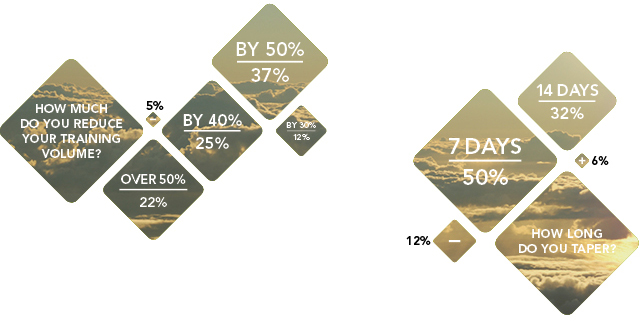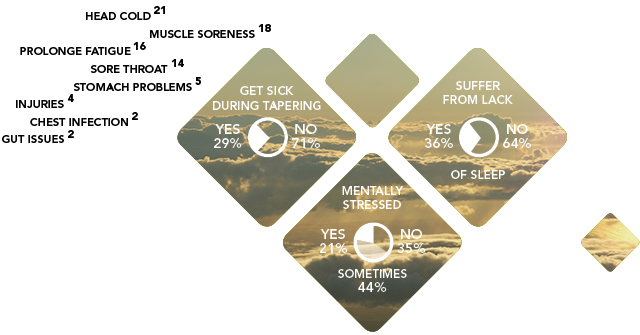 First for all thanks to all participants including Chris “MACCA” McCormack for taking the effort and answering all the questions. The results are definitely interesting and confirm some of the premises underlying this survey.
First for all thanks to all participants including Chris “MACCA” McCormack for taking the effort and answering all the questions. The results are definitely interesting and confirm some of the premises underlying this survey.
You may wonder why we did this survey as a company that is marketing Biestmilch/Colostrum. Tapering is a training phase in which the body is especially sensitive and the susceptibility to various health impairments increases.
But why? The issues you may observe during this period of time are mainly due to an imbalance rooted in the immune system, the autonomous nervous system and their interactions. These two system are extremely challenged during the training block that is preceding the taper phase. The reduced stress level during taper if not done properly according to your body’s needs can therefore lead to quite distinct problems that range from head cold over pain of unknown origin to sleep disorders.
Biestmilch as a substance interacting with the immune system and the autonomous nervous system on various level can help you to navigate safely through this critical period of time. We had 176 participants, really great. So results definitely have explanatory power. Thank you all again.
The answers to question one whether you follow a strict tapering strategy differed significantly confirming our assumption that hard-wired facts around tapering are still scarce. A total of 73 people (42%) follow a strict schedule, 35% do so occasionally, 23% of our participants don’t follow any tapering strategy.
2 How long is the duration of your taper?
When asked about the duration of their taper phase the majority of 88 individuals tends to taper at least 7 days (50%) or even longer (32 % 14 days, 6 % longer). Only 12 % taper for less than a week.
3 How much do you reduce your training volume?
Most of the participants reduce their training volume during taper. Only 5% reduce their training volume by less than 30 %, whereas 21(12 %) train 30% less. Nearly 25% of the participants reduce the volume by 40 %, further 66 (37 %) by 50% and 22% by even more. Overall the majority decreases training volume by 50%.
4 Do you reduce the frequency of your training session?
The answers to question 4 referring to the intensity of training sessions have been very clear cut. 97 participants (54%) don’t remain on the same intensity level while 81 (46%) keep up the same intensity level..
5 Do you focus more on quality training than on volume?
However nearly all of you focus more on quality training than on volume (89%). Only 11% have another focus.
6 Do you struggle with tapering on a regular basis?
The question whether you struggle with taper was answered by 50% with yes, and 50% with no. This response clearly underlines that knowledge around taper is still in flux and lots of open questions surround this topic.
7 Do you tend to get sick during tapering?
Referring to our 7th question 19% of our participants do complain of some kind of health issues during tapering, 81% don’t. The majority of these 19% develop a head cold, followed by muscle soreness, prolonged fatigue and sore throat. Some have an uneasy feeling and are worried of getting ill, others have vague signs of pain, and sleeping disorders, some even describe a kind of feeling depressed.
8 If yes, which symptoms/illnesses are you suffering from?
9 Do you suffer from a lack of sleep quality and/or duration?
Moreover 36% of the participants suffer from a lack of sleep quality and/or duration.
10 Does tapering stress you mentally?
Our last question was whether tapering stresses you mentally. Only 35% answered with no whereas 44 % answered “sometimes” and further 21% are stressed.
11 Do follow any special nutrition plan during taper?
Nutrition is beside training volume and intensity an important part of taper. Therefore it is not surprising that 71% of the participants follow a special nutrition plan. The variety of diet plans that circulate is manifold.
12 Are you afraid to gain extra kilos during taper?
Accordingly nearly every other (48%) is afraid of gaining extra kilos during taper.
As already stated the answers to our survey prove that this topic is flooded with open questions. We shall continue to dig deeper for answers that may float around.







